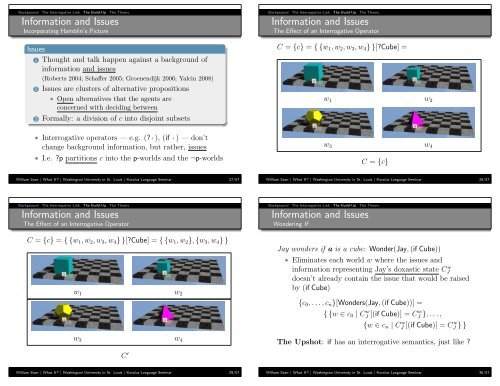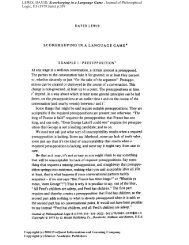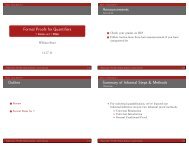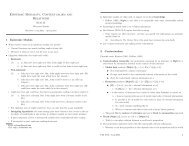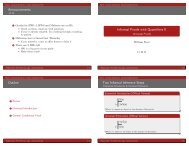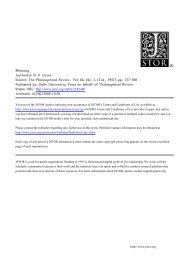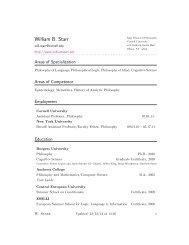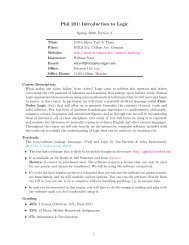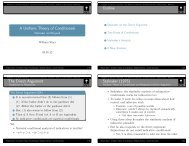What If? - Will Starr
What If? - Will Starr
What If? - Will Starr
Create successful ePaper yourself
Turn your PDF publications into a flip-book with our unique Google optimized e-Paper software.
Background The Interrogative Link The Build-Up The Theory<br />
Information and Issues<br />
Incorporating Hamblin’s Picture<br />
Issues<br />
1 Thought and talk happen against a background of<br />
information and issues<br />
(Roberts 2004; Schaffer 2005; Groenendijk 2006; Yalcin 2008)<br />
2 Issues are clusters of alternative propositions<br />
• Open alternatives that the agents are<br />
concerned with deciding between<br />
3 Formally: a division of c into disjoint subsets<br />
• Interrogative operators — e.g. (? · ), (if · ) — don’t<br />
change background information, but rather, issues<br />
• I.e. ?p partitions c into the p-worlds and the ¬p-worlds<br />
Background The Interrogative Link The Build-Up The Theory<br />
Information and Issues<br />
The Effect of an Interrogative Operator<br />
C = {c} = { {w 1 , w 2 , w 3 , w 4 } }[?Cube] =<br />
w 1 w 2<br />
w 3 w 4<br />
C = {c}<br />
<strong>Will</strong>iam <strong>Starr</strong> | <strong>What</strong> <strong>If</strong> ? | Washington University in St. Louis | Koralus Language Seminar 27/57<br />
<strong>Will</strong>iam <strong>Starr</strong> | <strong>What</strong> <strong>If</strong> ? | Washington University in St. Louis | Koralus Language Seminar 28/57<br />
Background The Interrogative Link The Build-Up The Theory<br />
Information and Issues<br />
The Effect of an Interrogative Operator<br />
C = {c} = { {w 1 , w 2 , w 3 , w 4 } }[?Cube] = { {w 1 , w 2 }, {w 3 , w 4 } }<br />
w 1 w 2<br />
w 3 w 4<br />
Background The Interrogative Link The Build-Up The Theory<br />
Information and Issues<br />
Wondering <strong>If</strong><br />
Jay wonders if a is a cube: Wonder(Jay, (if Cube))<br />
• Eliminates each world w where the issues and<br />
information representing Jay’s doxastic state C w J<br />
doesn’t already contain the issue that would be raised<br />
by (if Cube)<br />
{c 0 , . . . , c n }[Wonders(Jay, (if Cube))] =<br />
{ {w ∈ c 0 | C w J [(if Cube)] = C w J }, . . . ,<br />
{w ∈ c n | C w J [(if Cube)] = C w J } }<br />
The Upshot: if has an interrogative semantics, just like ?<br />
C ′<br />
<strong>Will</strong>iam <strong>Starr</strong> | <strong>What</strong> <strong>If</strong> ? | Washington University in St. Louis | Koralus Language Seminar 29/57<br />
<strong>Will</strong>iam <strong>Starr</strong> | <strong>What</strong> <strong>If</strong> ? | Washington University in St. Louis | Koralus Language Seminar 30/57


